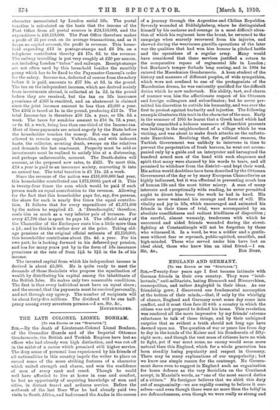THE LATE COLONEL LIONEL BONHAM.
[To THE EDITOR OF TEE "SPECTATOR."]
Stn,—By the death of Lieutenant-Colonel Lionel Bonham, of the Grenadier Guards and of the Imperial Ottoman Gendarmerie, the British and Turkish Empires have lost an officer who had already won high distinction, and was cut off in the midst of a career which promised still higher service. The deep sense of personal loss experienced by his friends of all nationalities in this country impels the writer to place on record some of the more striking features of a character which united strength and charm, and won the confidence of men of every rank and creed. Though he could well have afforded to live at home in ease and comfort, he lost no opportunity of acquiring knowledge of men and cities, in distant travel and arduous service. Before the outbreak of the last Boer War he had already paid two visits to South Africa, and had crossed the Andes in the course
of a journey through the Argentine and Chili= Republics. Severely wounded at Biddnlphsberg, where he distinguished himself by his coolness and courage in a most difficult situa- tion of which his regiment bore the brunt, he returned to the campaign when scarcely recovered from his injuries, and showed during the wearisome guerilla operations of the later war the qualities that had won him honour in pitched battle and the operations of a regular army. Many would have considered that these services justified a return to the comparative repose of regimental life in London ; but Bonham's temper forbade long resting, and in 1904 he entered the Macedonian Gendarmerie. A keen student of the history and manners of different peoples, of wide sympathies, which were not confined to one of the protagonists of the Macedonian drama, he was eminently qualified for the difficult duties which be now undertook. His ability, tact, and charm of manner won him the affectionate respect of his Ottoman and foreign colleagues and subordinates; but he never per- mitted his discretion to outride his humanity, and was ever the first to protest against barbarity and injustice. The following example illustrates this trait in the character of the man. Early in the summer of 1905 he learnt that a Greek band which had already committed a hideous massacre of Exarchist peasants was larking in the neighbourhood of a village which be was visiting, and was about to make fresh attacks on the unfortu- nate Exarchists. Realising that, for political reasons, the Turkish Government was unlikely to intervene in time to prevent the perpetration of fresh horrors, he went out accom- panied only by a guide and an interpreter and harangued the hundred armed men of the band with such eloquence and spirit that many were shamed by his words to tears, and all promised to withdraw from the district—and kept their word. His action would doubtless have been described by the Ottoman Government of the day or by many European Chancelleries as highly indiscreet, but it was effectual in preventing much loss of human life and the most bitter misery. A man of many interests and exceptionally wide reading, he never permitted aught to divert him from the work he had in hand. His culture never weakened his courage and force of will. His vitality and joy in life, which encouraged and animated his friends in their times of trial, were accompanied by an absolute unselfishness and radiant kindliness of disposition ; the careful, almost womanly, tenderness with which he succoured and aided friends wounded during the street- fighting at Constantinople will not be forgotten by those who witnessed it. In a word, he was a soldier and a gentle- man without fear or reproach, public-spirited, unselfish, and high-minded. Those who served under him have lost an ideal chief, those who knew him an ideal friend.—I anrr














































 Previous page
Previous page